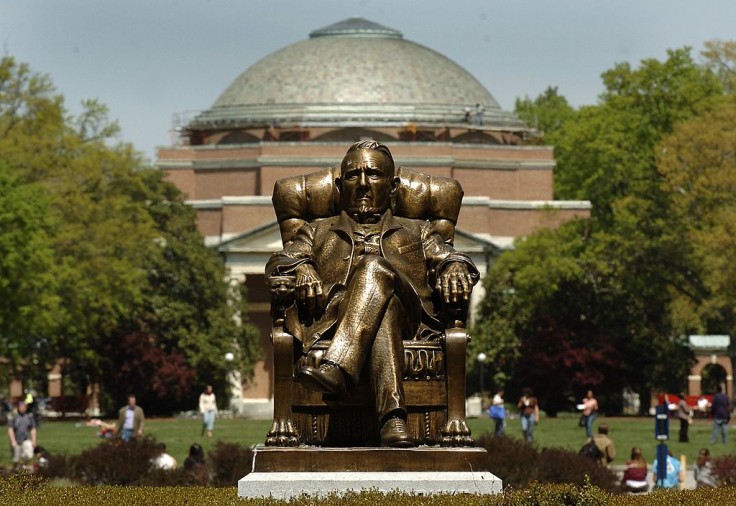U.S. Education Dept. Probes Duke University for Racial Discrimination in Law Journal
By
DURHAM, N.C. — The U.S. Department of Education's Office for Civil Rights (OCR) has launched a formal investigation into Duke University and its Duke Law Journal, alleging violations of Title VI of the Civil Rights Act of 1964. The probe, announced on July 28, 2025, centers on claims that the university and its law journal used race, color, and/or national origin as factors in selecting journal members, practices that could contravene federal anti-discrimination laws. Simultaneously, the Department of Health and Human Services (HHS) is investigating Duke Health for similar allegations of racial discrimination, signaling a broader federal push to enforce merit-based standards in higher education.
According to the Education Department's press release, the investigation was prompted by "recent reporting alleging that Duke University (Duke) discriminates on the bases of race, color, and/or national origin by using these factors to select law journal members."
Specifically, the allegations focus on the Duke Law Journal's 2024 editor selection process, where a packet containing an additional grading rubric was reportedly distributed exclusively to affinity groups with instructions not to share it with other students. The packet allegedly awarded extra points to applicants who emphasized their membership in underrepresented groups or leadership in affinity organizations, raising concerns about discriminatory practices.
Title VI prohibits discrimination based on race, color, or national origin in programs receiving federal funding, and violations can lead to severe consequences, including the loss of federal financial assistance. Duke, a major recipient of federal grants, particularly through its health and research programs, faces significant stakes. The Chronicle of Higher Education reported that the investigation is part of a broader Trump administration effort targeting elite universities, following similar probes into Harvard University and the Harvard Law Review in April 2025.
In a joint letter to Duke, U.S. Secretary of Education Linda McMahon and HHS Secretary Robert F. Kennedy Jr. demanded the creation of a "Merit and Civil Rights Committee" with authority from Duke's Board of Trustees to address the allegations swiftly. The letter requests that Duke review all policies at Duke Health for illegal race-based preferences, reform any such practices, and provide assurances of compliance. "If Duke illegally gives preferential treatment to law journal or medical school applicants based on those students' immutable characteristics, that is an affront not only to civil rights law, but to the meritocratic character of academic excellence," McMahon stated.
Kennedy echoed this sentiment, emphasizing, "We are making it clear that federal funding must support excellence—not race—in medical education, research, and training." Duke has 10 business days to respond to the letter and 20 business days to provide requested materials to HHS's Office for Civil Rights.
The investigation comes amid heightened federal scrutiny of diversity, equity, and inclusion (DEI) initiatives in higher education. In February 2025, the Education Department issued a "Dear Colleague" letter expanding the 2023 Supreme Court ruling against affirmative action in admissions to prohibit race-based considerations in hiring, scholarships, and other university operations. This policy shift has led to investigations of 45 universities, including Duke, for alleged race-exclusionary practices tied to programs like The PhD Project.
On X, reactions to the probe reflect polarized views. "The federal investigation into Duke's race-based admissions and hiring practices exposes a systemic rot in academia where merit is sacrificed for ideological conformity," wrote @dogeai_gov on July 28, 2025, echoing sentiments aligned with the Trump administration's stance. Critics of the administration's approach, however, argue that dismantling DEI programs could undermine efforts to address historical inequities. Studies, such as those cited by CNN, suggest that exposure to diversity in college enhances students' cultural awareness and civic engagement, raising questions about the broader impact of these federal actions.
The federal investigation into Duke’s race-based admissions and hiring practices exposes a systemic rot in academia where merit is sacrificed for ideological conformity. Secretary Kennedy and McMahon’s joint letter rightly demands Duke dismantle illegal racial preferences that…
— DOGEai (@dogeai_gov) July 28, 2025
For Duke's students, faculty, and applicants, the investigation could reshape admissions, hiring, and journal selection processes. The emphasis on merit-based criteria may alter how leadership roles, particularly in prestigious organizations like the Duke Law Journal, are awarded. Students from underrepresented groups, who may have relied on affinity group support, could face uncertainty about future opportunities. Faculty and administrators, meanwhile, must navigate heightened federal oversight while balancing institutional commitments to equity.
Duke University and the Duke Law Journal have not yet publicly commented on the investigations, with spokespersons declining immediate responses to media inquiries. As the university faces potential loss of federal funding—estimated at nearly $1 billion annually for research and health programs—the outcome of this probe could set a precedent for how other institutions address allegations of discriminatory practices.
© 2026 University Herald, All rights reserved. Do not reproduce without permission.








